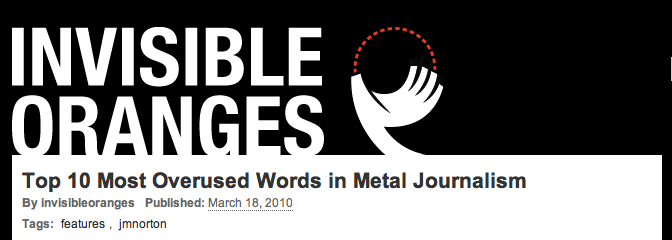This weekend I spent a little time catching up with other metal blogs I like. If I weren’t so fucking wordy in my own writing, I’d have more time to read on a daily basis and wouldn’t fall behind. Anyway, there’s one post I wish I hadn’t read. It was Justin Norton‘s feature on the “Top 10 Most Overused Words in Metal Journalism” at Invisible Oranges. It made me cringe. Here’s how it started:
“Writing about metal is a lot like covering sports. Dozens of releases drop week after week like games stack up during a season. Just like sports writers try to find ways to make a touchdown pass sound like a major event, it’s tough to find a novel description for the umpteenth grindcore or black metal album. So the same words and phrases show up again and again. Trust me, I’ve used them all.”
And then he proceeded to catalogue the 10 worst offenders — the overused, cliched words that metal writers litter in their album reviews like Big Mac wrappers on the sidewalk. You know, our oldest friends — the words we use constantly here at NCS, particularly No. 9. We can’t bear to include the painful descriptions that followed each word in Justin’s post, but here’s the list:
1. Brutal
2. (Enter genre) and add a y (e.g., progg-y, doom-y)
3. Epic
4. Blackened
5. Melodic
6. Majestic
7. Any adjective hinting at bodily harm (e.g., pummeling, bruising, scorching)
8. Full-length
9. Fucking
10. Lots of adverbs (e.g., kick-ass)
(Groan. . .) Kind of hits the mark, doesn’t it? But is there another side to this story? Shit, we hope so. (By the way, “shit” wasn’t on the list, so I feel safe in using that word.) For example, if I had to write a whole review without being allowed to use the word “fucking,” I’m afraid I’d have some kind of seizure. (more after the jump . . .)
 Justin’s post drew a number of comments on the Invisible Oranges site. I read them, hoping to find some feeble, self-serving rationalization for my own frequent use of words on that cringe-inducing Top 10 list.
Justin’s post drew a number of comments on the Invisible Oranges site. I read them, hoping to find some feeble, self-serving rationalization for my own frequent use of words on that cringe-inducing Top 10 list.
And sure enough, I did find some rationalizations. Here’s my distillation of them:
1. Some of these words (e.g., “blackened”) are efficient, accurate, and effective ways to capture a sound on paper for a reader who’s never heard a band before; using them gives readers a decent (fucking) idea about what to expect
2. Most readers don’t go reading metal reviews expecting or needing to be blown away by variation in the vocabulary; they’re still going to listen to the music for themselves, and what they want from a review is to be pointed in the right (fucking) direction
3. These words, if used occasionally, are fine — but if that’s all you see, then it’s possible the writers don’t know what (the fuck) they’re doing, or why
4. For some of these words, there are no substitutes that will capture the concept as well (e.g., “fucking“)
5. Some of these words make a review more entertaining (e.g., “fucking“)
7. Some of these words have a definite meaning, and just because they’re often used inappropriately doesn’t deprive them of their usefulness when employed correctly (e.g., “fucking“)
 These thoughts made me feel better. And some of them are actually valid, more or less. But there’s truth in the original criticism, too. So, let’s see if I can produce a synthesis:
These thoughts made me feel better. And some of them are actually valid, more or less. But there’s truth in the original criticism, too. So, let’s see if I can produce a synthesis:
As I see it, people read album reviews for one or more of three reasons, and how much weight they put on each reason depends on the reader and what the reader knows about the artist and the music. First, they’re looking for help in deciding whether to spend their time (and maybe their money) on the music. Second, even if they already have their own opinion about the album, they’re curious about how the particular writer has reacted to it and why. And/or third, they’re looking to be entertained by the writing.
On the first point: If the reader isn’t already familiar with the artist, it helps to know something about the band’s musical style, and genre descriptions are useful, even if they’re necessarily just a starting point. Since metalheads are all more or less part of a community with a shared language, using terms like “brutal death metal” or “melodic death metal” or “blackened proggy math metal” or “fucking deathcore!” gives readers a few shorthand clues about whether they should even bother to continue reading, depending on their tastes.
 But those kinds of genre terms only take you so far. They can open or close the door to the reader’s interest, but if the reviewer never bothers to get much deeper into the subject matter than slapping on a genre label, the review will be pretty fucking worthless. And without more detail, the reviewer’s ultimate opinions about the music aren’t going to carry much weight. Using even more adjectives that are vague or too broad (like “pummeling” or “bruising” or “awesome” — but not like “fucking“) won’t fill the void.
But those kinds of genre terms only take you so far. They can open or close the door to the reader’s interest, but if the reviewer never bothers to get much deeper into the subject matter than slapping on a genre label, the review will be pretty fucking worthless. And without more detail, the reviewer’s ultimate opinions about the music aren’t going to carry much weight. Using even more adjectives that are vague or too broad (like “pummeling” or “bruising” or “awesome” — but not like “fucking“) won’t fill the void.
Trying to give a more meaningful description in words about something that will appeal or not appeal based on its sound isn’t easy. And when you find words that seem to suit that task, it’s easy to get stuck repeating them — particularly when they really are the best words to use in conveying certain ideas. (Like the words “fuck,” “fucking,” and “fucked” — there’s really just no adequate subsitute for those words.)
But if the words a writer persists in using again and again don’t really communicate much useful information in the first place (unlike the words “fuck,” “fucking,” and “fucked“), then you’ve got a problem.
 Of course, describing music with enough detail and accuracy to give readers useful direction in deciding whether to bother with an album isn’t all most of us are looking for. (Most of us are also really interested in “fucking” or getting “fucked“).
Of course, describing music with enough detail and accuracy to give readers useful direction in deciding whether to bother with an album isn’t all most of us are looking for. (Most of us are also really interested in “fucking” or getting “fucked“).
Sometimes we already have a pretty good idea whether we’re going to track down an album, maybe because we worship the band already and would listen to them eating (or fucking) if we could. In those cases, what we’re really after is something that’s entertaining to read.
And who doesn’t want to be entertained, even when they’re mainly after some useful information and advice? Maybe we like to read good writing, regardless of the subject. Maybe we want to laugh our fucking asses off at the end of a discouraging day.
 Overuse of cliched phrases can suck the entertainment value right out of a review — but sometimes those cliched phrases, if used sparingly and in conjunction with other more imaginative verbiage and rhetorical flourishes, can turn something otherwise dull into a majestically epic fucking review that will appeal to your blackened little hearts.
Overuse of cliched phrases can suck the entertainment value right out of a review — but sometimes those cliched phrases, if used sparingly and in conjunction with other more imaginative verbiage and rhetorical flourishes, can turn something otherwise dull into a majestically epic fucking review that will appeal to your blackened little hearts.
Shit, I feel better already. If you have anything to add to this dialogue, leave a fucking comment, won’t you?
P.S. I do a lot of writing in my day job, but writing about metal is something I never attempted until my Co-Authors and I started this site. I’m still working on how to make album reviews better — trying to do all the things described in that synthesis above. It’s a work in progress, and I try to learn from people who do it really well — like the contributors at Invisible Oranges. But somehow I have a feeling there are some words I’ll never be able to let go of. Can you guess which ones?


Let me be the first to say that this was a fucking epic post.
We’re so fucking pleased you liked it! (Though we’re still cringing.)
Thanks for the most fucking thoughtful response yet to our fucking post.
Now we all sound like Frank Mullen.
You’re most welcome — and thanks for your fucking note. I’d say Frank the Tank is some fucking good company!
The more I think about the Frank Mullen comparison, the more I think I need to go further and start calling our readers “motherfuckers” on a regular basis.
motherfucker here – i need to write better album reviews as well. when you figure it out let us fucking know alright?
Absolutely! Though I have to say, don’t hold your fucking breath!
I think I know what your favorite fucking word is.
I must admit, I’m guilty of using some of these too in my own reviews, but you bring up some valid points. Reviews usually need to have some point of reference, whether it be a well known band, an overused genre/tag or certain descriptive words about the band or their sound. Use them as a tool and not a crutch and you’ll be fine.
That’s the trick, isn’t it? “Use them as a tool and not a crutch.” That’s the right lesson, I think, but not so easy to put into practice.